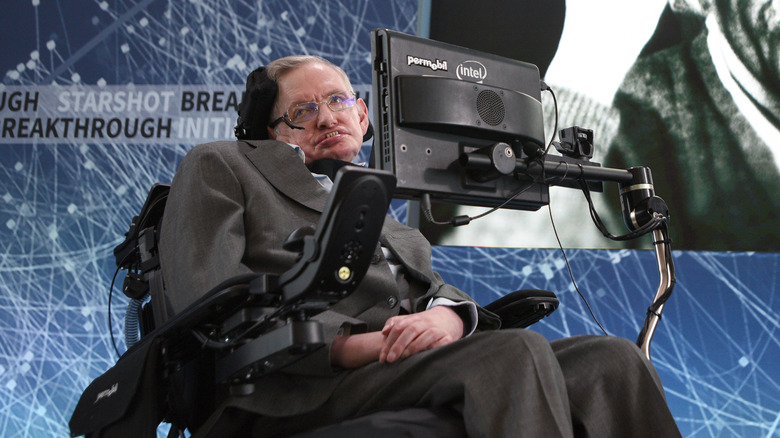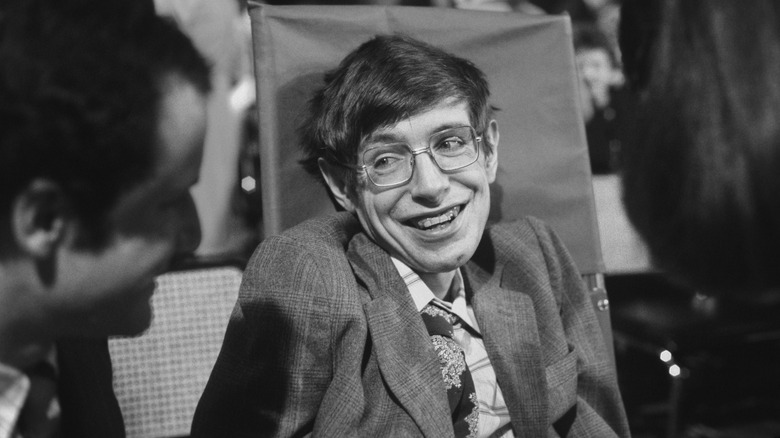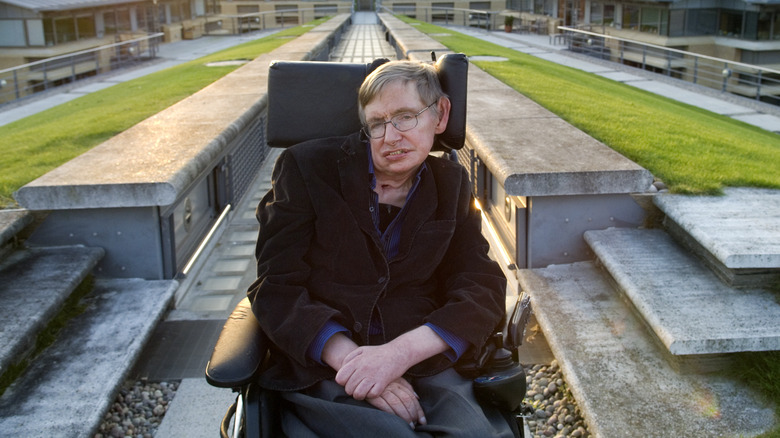Stephen Hawking's Biggest Failures That Everyone Forgets
Professor Stephen Hawking was one of modernity's greatest theoretical physicists. He wrote the book on black holes, was ahead of the curve when it came to understanding the Big Bang, correctly postulated that information swallowed by black holes does not disappear but evaporates through quantum "virtual photons," and other such cutting-edge insights. And to top it all off, he did this with an extremely debilitating disease, arterial lateral sclerosis (ALS). People with ALS usually don't live more than two or three years past their diagnosis. Stephen Hawking lived 55 years with it.
But much like other success stories, Stephen Hawking didn't always get everything right. He learned through trial and error, as all of us do — even the most brilliant minds. His initial findings regarding Hawking radiation — those virtual photons we talked about — stumped even him. That equation is still the closest we've got to a vaunted "theory of everything," as it reconciles thermodynamics, quantum theory, and general relativity — Einstein's famous work about the relationship between mass and gravity. Researchers are still figuring Hawking's work out today.
Also, Hawking wasn't the best student — not because he was dumb, but because he was lazy. He was a so-so student in elementary school. And as the NY Post quotes his 1988 book, "A Brief History of Time," Hawking estimated that he did "about a thousand hours of work" once he reached Oxford University, or a mere one hour per day over three years.
Stephen Hawking wasn't a fantastic student
Even from a young age, it was apparent that Stephen Hawking was an unusual kid. Quiet and reflective, he "always had a strong sense of wonder," especially when it came to space, as Biography quotes his mother. He was also, as we all know, a highly intelligent and gifted person. But intelligence has nothing to do with hard work, and in fact can inhibit it as understanding comes easily. And in Hawking's case, his intelligence was also highly specialized, sometimes at the cost of other abilities. These quirks reflect in Hawking's academic career all the way through his time at Oxford. Whether or not it's a "failure" to not try hard when he didn't have to, and then go on to become one of physics greatest luminaries, is up to the reader.
As Biography explains, Hawking was just an average student in grade school at St. Alban's boys' school in St. Albans, England — in fact, he scored third from the bottom. He also apparently didn't really learn to read until age 8. Then, when he entered Oxford University at age 17 to study physics he found the mathematics "ridiculously easy," as GeniusU cites, and didn't give it his all. He didn't really turn things around until he received his ALS diagnosis at age 21. "By losing the finer dexterity of my hands, I was forced to travel through the universe in my mind and try to visualize the ways in which it [the cosmos] worked," Biography quotes him.
Hawking's own work stumped him
Even though black holes litter modern sci-fi, it's only been a little over 100 years since German physicist and astronomer Karl Schwarzschild first postulated their existence in 1916. This happened just one year after Albert Einstein published his theory of general relativity describing the relationship between mass and gravity in 1915.
From then until Stephen Hawking's work on black holes in the early 1970s, everyone thought black holes sort of hung around the universe forever. But according to Hawking's calculations — and his "surprise and annoyance," per Aeon – black holes radiate heat and dissipate over a tremendous amount of time. This work on "black hole thermodynamics" — which unified Einstein with classical and quantum physics — meant that if "an astronaut falls into a black hole, he will be returned to the rest of the Universe in the form of radiation." But when Hawking delivered his paper in 1973 to Rutherford Laboratory in Oxfordshire, session chairman John Taylor called Hawking's work "absolute rubbish." Plus, as we mentioned, Hawking's own work confused him. It took some time to convince both himself and the greater scientific community of the truth behind his math.
The black hole-shrinking radiation he discovered has been dubbed "Hawking radiation" in his honor. As New Scientist shows, that equation is now inscribed on Hawking's tombstone along with the epitaph, "Here lies what was mortal of Stephen Hawking." Hawking died in 2018 at the age of 76.


